Easy Way to Put on Support Hose With Garbage Bag
Last Updated February 6, 2022
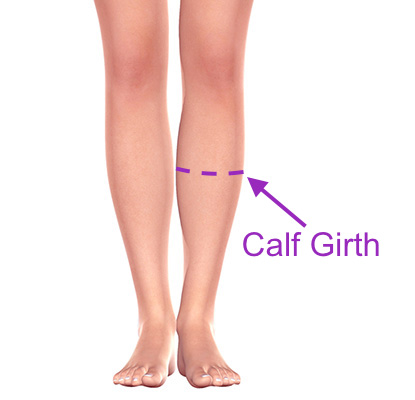
Looking to Buy a Pair of properly-sized Compression Socks?
Click the button below to see the lineup of ComproGear Compression Socks.
NOTE: The page includes a sizing chart and free returns, so you're always sure to get the perfect size!
Those who wear compression stockings know that getting them on can be challenging. The good news is, there are easier ways to don your stockings and move forward with your day.
ComproGear has put together a collection of tips and tricks to help you simplify your compression sock routine.
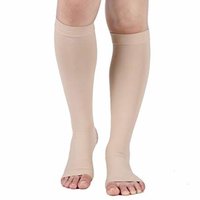
The Easy Way to Put on Compression Stockings
Here's how to put on compression socks:
Tip 1: Prepare Your Feet and Legs
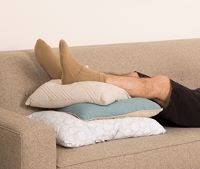
It's a great idea to put your compression hosiery on first thing in the morning before any swelling occurs from the day's activities. This will allow the stockings to slide on with greater ease.
Alternatively, you may lay down and rest your legs on an elevated pillow for about 15 minutes to reduce swelling before donning your socks.
Your legs should also be clean and dry. Dry off completely after bathing and if it is a particularly humid day, sprinkling talc or cornstarch across the legs can help the fabric of the socks slide on smoothly.
Tip 2: Get Into the Right Position
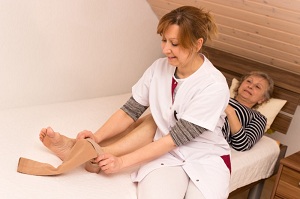
To pull on your compression stockings with ease, place just your toes into the stocking's toe area.
The rest of the sock will be bunched up around the toes as you do this. Gradually unravel the sock upwards towards your knee.
Do not crouch on the floor or bend over while standing, as this will make it difficult to pull your compression hose on.
It is best to sit in a chair while donning your socks.
You may need to ask for help to slide your socks onto your legs if you struggle with mobility issues.
Tip 3: Smooth the Fabric
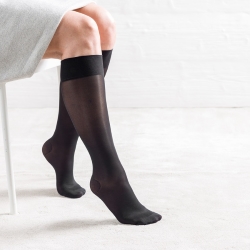
Wrinkled stockings are difficult to wear. Creases in the material can apply excessive pressure to the skin beneath them, causing discomfort or cutting off circulation.
Be sure to smooth out any creases in the fabric once your socks are on. This will ensure you're getting the optimum pressure application from your stockings.
Do not fold over the top of your compression hose as this can interrupt blood flow.
Tip 4: Use a Plastic Bag
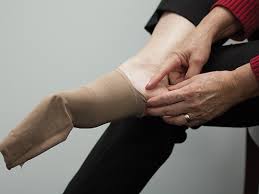
If you wear open-toe compression stockings then this trick is for you. Slip a plastic bag over your foot and heel.
The plastic bag's slippery surface will help your compression hose slip onto your leg with ease.
Once your sock or stocking is on, carefully pull out the loose plastic bag through the open-toe of your stocking.
You can also try using a silk foot slip to help you put on your compression socks. It works in much the same way as the plastic bag trick.
All you need to do is to place your foot into the silk foot slip then pull your pressure sock over it and onto your leg, just as you would with a regular sock.
Tip 5: Try Talcum Powder
An effective method for donning compression stockings without the hassle is to use talcum powder or cornstarch.
Sprinkle some across your ankles and legs before pulling your socks on. These silky powders allow close-fitting compression garments to slide over the skin easily.
Talcum powder can also help absorb excess moisture on the skin.
Tip 6: Apply Lotion at Night Only
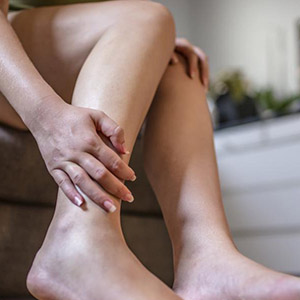
Applying lotion and creams to the legs will make it difficult to put your stockings on.
Moisturized skin tends to stick to or grab the fabric of the socks as you attempt to pull them on.
One solution to this problem is to apply lotion before going to bed rather than in the morning.
This allows enough time for the cream to absorb into your skin, leaving it smooth enough in the morning for the compression socks to slide on easily.
Tip 7: Donning Tools
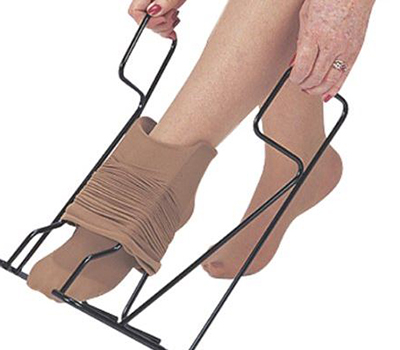
There are several donning tools available commercially that can help if you're struggling to get your compression stockings on.
You can purchase these tools at medical equipment or online stores. The prices will vary according to the brand.
Popular donning devices include Medi Butler, Juzo Slippie Gator and Sigvaris Doff n' Donner.
These tools are ideal for elderly people or anyone with a mobility issue that has difficulty putting on compression stockings.
Remember to check the measurements and size requirements before purchasing a donning tool.
These tools come with instructions but there are also many helpful instructional YouTube videos online.
Tip 8: Donning Gloves
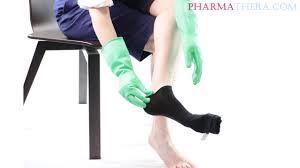
Donning gloves are a great tool to help you firmly grasp your stockings without tearing them.
It can be quite difficult to grab and pull the stocking fabric with your bare hands. This is where gloves can come to the rescue.
Various brands manufacture gloves that can be worn while donning compression stockings.
These gloves also protect the stocking fabric, especially if you are concerned about your nails tearing the hosiery.
If you are allergic to latex, try a pair of latex-free donning gloves. Rubber gloves, like the ones you might wear while washing the dishes, can be used to put your compression socks on with the same result.
The video below demonstrates how.

Looking to Buy a Pair of properly-sized Compression Socks?
Click the button below to see the lineup of ComproGear Compression Socks.
NOTE: The page includes a sizing chart and free returns, so you're always sure to get the perfect size!
What to Avoid When Wearing Compression Stockings
- When wearing compression stockings, never fold the tops of the stockings over, even if they are longer than required. When you fold the compression stocking over, you double the amount of compression applied to that area of the leg. This can cause circulation issues and pain.
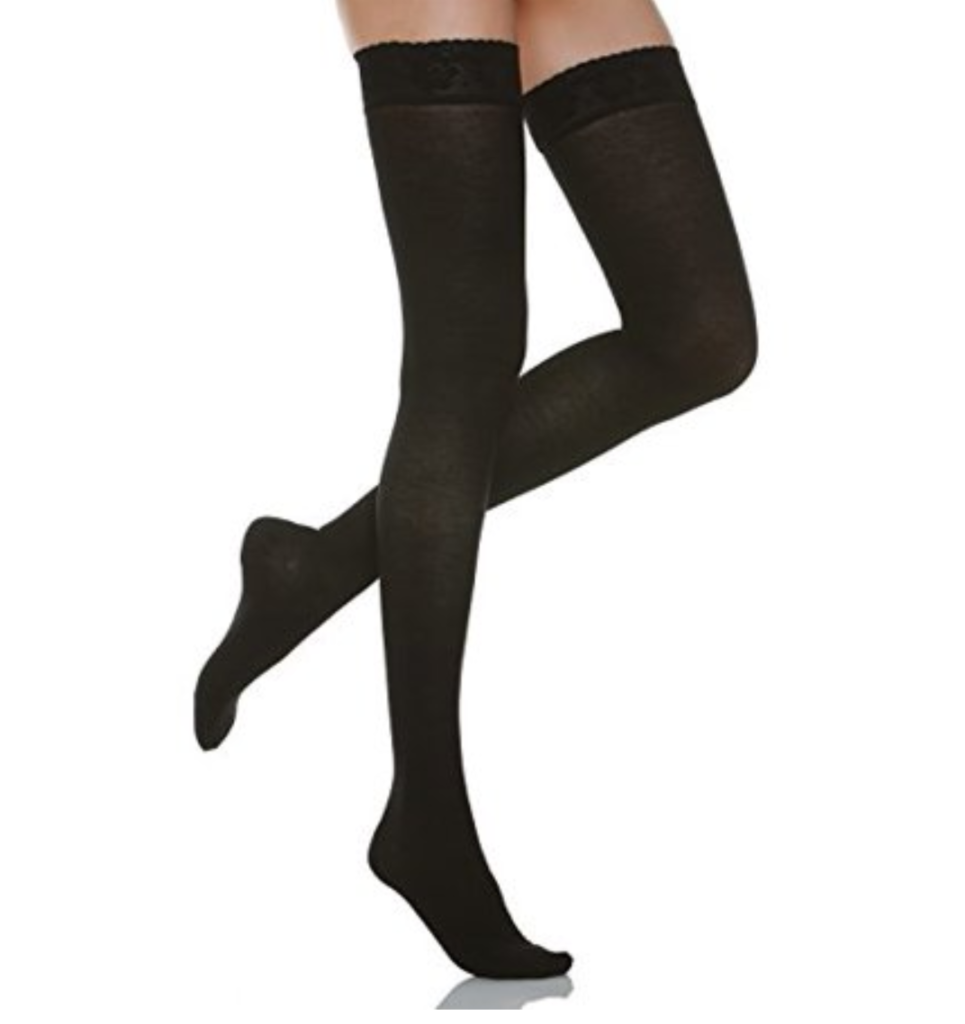
- Never pull your stockings forcefully by tugging at the fabric. This could damage the fabric of the stocking and cause tearing. Instead, opt for a donning device or try one of our tips for easing the process of getting your compression socks on.

- It is normal for compression stockings to be tighter than regular socks. It may take time to get used to the compression. If you feel that your stockings are too tight or too loose, it's a good idea to consult with your doctor to ensure you are getting the correct fit.
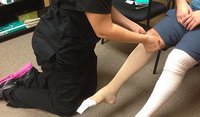
- Clean your stockings on a regular basis. By taking proper care of them, your stockings will retain their ability to apply firm pressure for several months, even with daily use.

- Always remove your compression stockings before going to bed. This allows your skin to breathe a bit. It is quite easy to remove your stockings. All you need to do is to roll the stocking down to your ankle. Then, use your thumb to wiggle and move the rolled up stocking away from your heel and slowly slip it off.

A Look at Compression Stockings
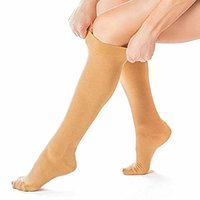
Compression stockings are a unique type of therapeutic wear that helps to improve blood circulation in the body.
These socks and stockings are often used to reduce pain or swelling in the legs.
Compression stockings can also lower your risk of Deep Vein Thrombosis (DVT) by exerting pressure on your legs as you wear them.
This gentle pressure assists with blood flow from the legs and back to the heart, preventing the clotting and pooling of blood.
Pressure Levels
You will find compression stockings in a range of sizes and pressure levels. When shopping for your compression socks, note that mmHg is used for denoting the pressure exerted by compression stockings.
A higher mmHg indicates a higher amount of pressure being applied to the legs by the compression sock. For example, 30mmHg is a higher pressure application than 15mmHg.
Mild Pressure Ratings
For those who do not have a medical diagnosis, using compression socks with a mild pressure rating will suffice. A low pressure rating can help you deal with tired legs and mild swelling.
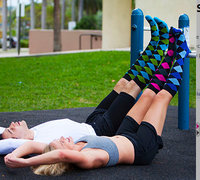
Sizing
A compression sock should offer a "snug" fit but shouldn't be excessively tight. Before you make a purchase, take a look over the sizing chart to get an idea about which size would fit you best.
Graduated Compression
Medical grade compression socks are generally tighter in the ankle portion of the sock and gradually become less tight towards the knee.
This type of compression is called graduated compression. TED socks and many varieties of compression garments use graduated compression.

Where to Buy Compression Hose
You can purchase compression socks from medical equipment stores or ComproGear.
If you need compression hose for medical reasons, your doctor will prescribe the right compression according to your needs and will help you order the correct size.
Prices will vary according to the type of compression sock and its brand.
Who Wears Compression Stockings?

Those who suffer from medical conditions related to poor circulation can benefit from wearing compression stockings:
- Anyone recovering from varicose vein surgery.
- Athletes who are recovering from an injury or who are training extensively.
- Those who are at risk of developing Deep Vein Thrombosis (DVT), varicose veins, edema or leg ulcers.
- Those who spend a lot of time sitting such as pilots, frequent fliers, truck drivers, etc.
Benefits of Wearing Compression Stockings

Regardless of why you choose compression stockings, you're bound to reap a variety of benefits.
Both medical benefits and general improvements to your overall well being can be experienced by wearing pressure socks.
The main benefit of wearing compression garments is better blood circulation.
Improved flow of blood helps to prevent a myriad of symptoms and medical conditions:
- Prevents dizziness upon standing (orthostatic hypotension).
- Helps maintains energy levels, even during long shifts at work.
- Provides support for healing veins after varicose vein surgery.
- Can prevent the formation of varicose veins.
- Reduces swelling of the legs and ankles.
- Prevention of sore and tired muscles.
- Decreased risk of blood clotting.
In Conclusion
There are many reasons you could be having trouble wearing compression socks. Sometimes the compression socks are simply the wrong size, style or fabric for your needs.
In such cases, it is best to touch base with your physician or speak with a pharmacist about your options.
However, by using these easy tips and tricks, you can feel confident about wearing your compression stockings.
If by any chance you are unable to don your compression stockings easily, you should consult with your doctor as soon as possible.

Looking to Buy a Pair of properly-sized Compression Socks?
Click the button below to see the lineup of ComproGear Compression Socks.
NOTE: The page includes a sizing chart and free returns, so you're always sure to get the perfect size!
Source: https://comprogear.com/easy-way-to-put-on-compression-stockings/
0 Response to "Easy Way to Put on Support Hose With Garbage Bag"
Post a Comment